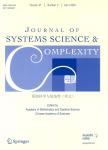Q-Learning-Based Target Selection for Bearings-Only Autonomous Navigation
Q-Learning-Based Target Selection for Bearings-Only Autonomous Navigation作者机构:Science and Technology on Space Intelligent Control LaboratoryBeijing Institute of Control EngineeringBeijing 100094China
出 版 物:《Journal of Systems Science & Complexity》 (系统科学与复杂性学报(英文版))
年 卷 期:2021年第34卷第4期
页 面:1401-1425页
核心收录:
学科分类:08[工学] 081105[工学-导航、制导与控制] 0811[工学-控制科学与工程]
基 金:supported by the National Natural Science Foundation under Grant Nos.61573059 61525301 61690215
主 题:Bearings-only autonomous navigation convergence analysis extended Kalman filtering Q-Learning target selection
摘 要:This paper presents a Q-learning-based target selection algorithm for spacecraft autonomous navigation using bearing observations of known visible *** the considered navigation system,the position and velocity of the spacecraft are estimated using an extended Kalman filter(EKF)with the measurements of inter-satellite line-of-sight(LOS)vectors obtained via an onboard star *** paper focuses on the selection of the appropriate target at each observation period for the star camera adaptively,such that the performance of the EKF is *** derive an effective algorithm,a Q-function is designed to select a proper observation region,while a U-function is introduced to rank the targets in the selected *** the Q-function and the U-function are constructed based on the sequence of innovations obtained from the *** efficiency of the Q-learning-based target selection algorithm is illustrated via numerical simulations,which show that the presented algorithm outperforms the traditional target selection strategy based on a Cramer-Rao bound(CRB)in the case that the prior knowledge about the target location is inaccurate.



